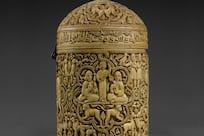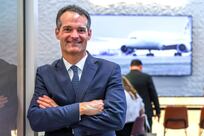"Today the US president Barack Obama arrives in Saudi Arabia and then in Egypt he will deliver his long-awaited message," wrote Tariq Alhomayed, editor-in-chief of the London-based daily Al Sharq al Awsat. "The visit comes at a time when our Arab world is utterly divided and weak. In the meantime, we note articles and television debates asking President Obama to fulfil a list of demands in order to earn Arab and Muslims' benediction.
"Arabs again demand from President Obama to recover the Palestinian Occupied Territories and the Golan Heights, to stop the Iranian nuclear programme, to withdraw from Iraq, to withdraw from Afghanistan, to shut down Guantanamo detention camp and to release detainees, but we hardly hear what Arabs could do, in turn. "So what if President Obama tells the Arabs: 'Well, I'll do what I can, but I'll ask you for one thing. Could you please put an end to the Palestinian strife? Can anybody do that?' It is this national as well as other regional conflicts that have affected the Palestinian issue." President Obama's speech sounds important after eight years of George Bush's term that only triggered more violence, wars and terrorism. The reality, however, is that President Obama does not possess a magic wand to spell change overnight.
"Official US data confirms the death of 24 US soldiers in May alone, the worst toll sustained by US occupation forces since last September; meanwhile, losses among Iraqi civilians have considerably declined," reported the leading article of the London-based newspaper Al Quds al Arabi.
That is to say, the opposition's operations against US troops have increased, whereas sectarian arbitrary attacks on civilians have noticeably decreased to their lowest level since the invasion in 2003. Multiple factors have led to this outcome, among which are al Qa'eda's success in reorganising itself, the return of Awakening insurgents to fight alongside the opposition, and the failure of the prime minister Nouri al Maliki to achieve national reconciliation.
The rise in the death toll among American troops came just one month before they were to withdraw from cities in line with the security plan. The new developments put into question the ability of Iraqi forces to undertake their security responsibilities after their American counterparts leave. "It is hard then to predict the security prospects of Iraq in the next few months, though the present indicators foretell some hard times. The fact that a rocket reached the Green Zone means the opposition has recovered and possesses arms and followers."
Hassan Madan wrote an opinion piece for the UAE-based newspaper Al Khaleej in which he stressed the growing importance of cultural development in Gulf states. "Cultural development can only be achieved through continuing efforts by governments. The latter are required to invest equally in culture as they do in education, health care and other public services. Moreover, spiritual and mental development should be seen as no less important than other aspects of development."
To achieve cultural dynamism, the very concept of culture should be promoted as a prerequisite for sustainable development. This implies a stable public investment in cultural infrastructure. "It is only by providing the appropriate environment coupled with a strategic vision that we can attract potential talent and eventually produce generations of creative artists in various fields of drama, music, cinema and other fields." There is a necessity for a more systematic approach to culture as a social event. In other words, Gulf states need to draft well-crafted cultural programmes with multi-phased goals spanning short, medium and long terms.
Satea Noureddine wrote in his regular column for the Lebanese daily Al Safir that the upcoming legislative elections have received wide interest regionally as well as internationally. "Many consider their outcome as very decisive on the basis of how they will draft their policies regarding Iran and Syria."
But such praise for the Lebanese "lame democratic experience" is a bit exaggerated. Lebanese elections seem to appeal more to outsiders than to insiders. At a time Arab and foreign countries are looking forward to the ballot results after June 7, "most Lebanese, however, give the impression that they know in advance who will be representing them". However, if any new event happens on the Lebanese political scene, it would likely affect the overall regional strategic scene.
This is perhaps why it has always attracted wide international attention. The US, for example, since former president George Bush's era, has become keener to closely follow the political process in Lebanon in order to confine the influence of Syria and Iran. * Digest compiled by Moustapha ElMouloudi melouloudi@thenational.ae




